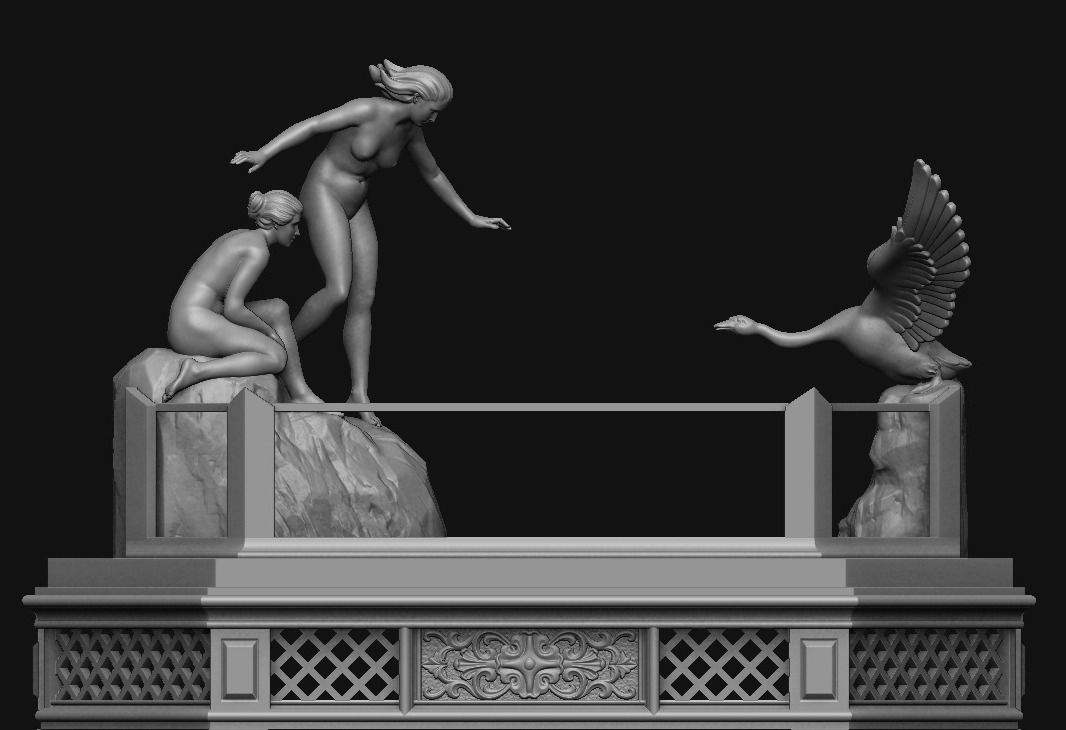Aquarium top (no table legs) early 20th Century - 12th scale kit
Kit contains Table top with the swan and seated bather, standing bather. Clear acrylic sheet supplied.
Original life size creation by Theodore Ullmann - Austria. Early 20th century 1930
When I first came across the work of Theodore Ullmann I fell in love with his small range of Aquariums. The delightful masterpieces are both playful and imaginative. Perfect for 12th scale. That is what we love about miniatures - the excitment of creating a tiny world that is as real to true life as possible and sometimes quite fantastical! This table aquarium gives us the best of both worlds. Immediately a story takes place in our imagination about the bathers and the swan...they are a moment of a story captured in time for us to enjoy.
This is a kit and consists of the clear panels of which there are 6, the top section with a seperate bather, the legs and the leg brace. Once painted and assembled the aquarium could be filled with clear resin or similar to represent water and then all manner of fun can be had adding plants, maybe a few small fish or a frog etc.....if you fill it with resin please check that the edges are all sealed.
The kit is both metal Pewter and resin.
NOTE: At the time of launching we have a batch of legs that are very slightly bowed - this is not an issue as they can be gently bent back straight. I shall check the legs before despatch. If you have any issues then please do contact me.
Measurements:
Floor to table7.8cm
Floor to top of head 12cm
Width of table 7.8cm
Depth table 5.1cm
NOTES
As with all my metal designs the pieces will require a little cleaning using a file and/or sandpaper. The metal is very soft so this is a simple and satifying part of the build process.
I tend to use superglue (Hafixx being my favoured choice) with a super glue activator to speed things up.
To paint the item I strongly recommend a metal primer. Spray primers are the easiest and just a light coat with give the paint something to 'key' with......then the choice is yours. I use all types of paints from acrylics to cellulose spray paints. All have their own merits and so I choose according to the finish I wish to create.
After applying my coats of paint I will always add an aging layer of raw umber acrylic (water it down and then paint and wipe off to leave the dark paint in the recesses). Aging can be very rewarding and there are many options for this. One little recommendation is to use rotten stone/pumice stone powder to add what I like to describe as "dust" to the piece. It is a powder and will always be a powder unless mixed with a binder such as glue. The powder is a soft grey and if it is brished on then off it will leave a slight dusting in the recesses of the design.
A final flourish of splatter (very subtle brown/grey applied with by splattering the paint from a bristled brush such as a toothbrush) adds a little more interest.
Aquarium top only 1930 12th scale kit
Always prime metal using a spray metal primer available online in most countries. I use Rust-oleum.
Spray paints: I tend to use platikote and rust-oleum but there are many other brands who sell similar products. In the UK you can pick them up in B&Q but also available in abundance online. The choices are huge but my all time favorite colour is Rust-oleum Hessian. It is a taupe and works well if you are looking for a old heavy brown cream finish.
Paints: use almost anything - emulsion (wall paint - sample pots are cheap), acrylic, oils (generally you will get a sheen). Alway use a fine brush and dont apply too much - you can always add layers which look better than clumpy thick layers.
Make your own paints using https://www.cornelissen.com/pigments-gums-and-resins.html then add a binder such as glue or wax.
Gold and silver: Gold leaf but also gold particles suspended in a medium suitable for painting etc. This is a huge area and so I will offer a few of my favorites:
- Spray gold - lots of choice online
- If you plan to use gold leaf or Dutch metal (a cheaper and easier to use alternative) then paint the item red or yellow. This will show through the cracks and add depth.
- You will need to use Gold leaf "size" when applying leaf - its a sticky glue that doesnt stop being sticky
- I like Polyurethane gold - its easy to apply and you can wash brushes in water but its hard to source and will go off after a few years. I buy mine from "Bristol paints" https://www.bristolpaint.com/metallic/polyurethane
Some links to gold and silver finishes that I would recommend -
- Connoissier https://www.jacksonsart.com/brands/connoisseur
- https://www.croberson.co.uk/product-sections/roberson-gilding-materials.html
- https://www.robersonliquidmetal.co.uk/
- https://www.tiranti.co.uk/Products/gold-leaf
- https://www.modernmasters.com/landing/homeowners/brands/mpc
- https://www.bristolpaint.com/metallic/acrylic
- https://www.bristolpaint.com/metallic/polyurethane
- for people in the USA: https://sculptnouveau.com/products/metal-coatings
Of course you can make your own! Use bronze powder which is available in silver, gold, brass, bronze etc colours. Add this to wax or a glue so that it has a binder. If there are any salts in the glue then you will see your gold oxidise!
Varnish?
- I love to use wax on some items as the sheen is soft and it gives a classic patina.
- Spray varnish - polyeurethane can go yellow!
- Brushed on varnish such as modge podge is great and comes in different sheen levels.



